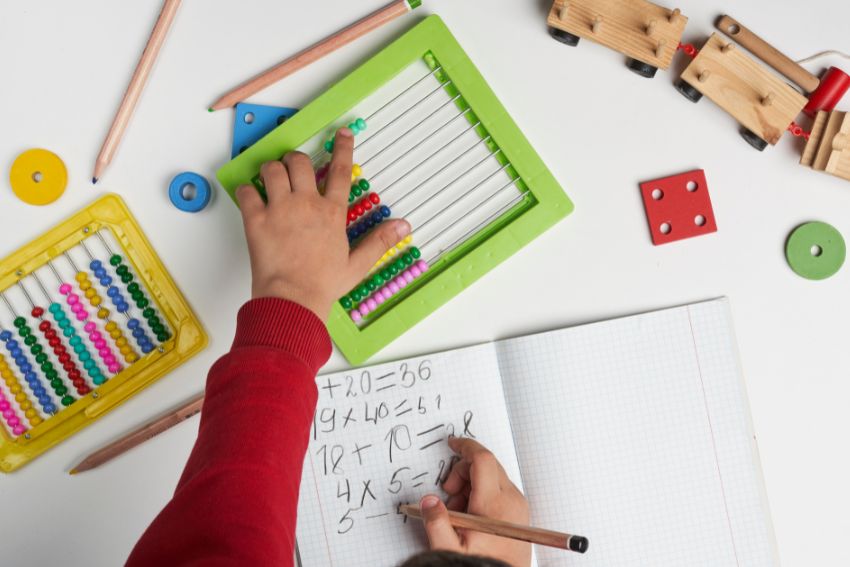Finding easy maths games can make learning enjoyable and stress-free for children. Many kids find maths challenging, but when it’s introduced through play, it becomes fun and engaging. With the right approach, children can develop a positive attitude towards numbers while improving their skills.
Games make maths feel interactive and exciting. Instead of just memorising numbers, children practise counting, problem-solving, and logical thinking through play. This not only improves their understanding but also helps them retain what they learn for longer.
In this blog, we’ll explore top 5 easy maths games that make learning fun. These games are simple and require little to no preparation. Whether your child enjoys numbers, puzzles, or hands-on activities, there’s something here for everyone. By the end, you’ll have a set of practical games that will turn maths into an enjoyable experience.
List of Top 5 Easy Maths Games
Let’s explore five easy maths games that make learning fun. These games require minimal setup and can be played at home with simple materials.
1. Math Bingo
Math Bingo is a great way to help children practise basic addition and subtraction while keeping them engaged. To play, create bingo cards with numbers in each square. Instead of calling out traditional bingo numbers, read out simple maths problems like 5 + 3 or 10 – 4. Children must solve the problem and mark the correct answer on their cards. The first to complete a row shouts “Bingo!” and wins.
You can check this websites: Topmarks and Maths Playground for free interactive games.
2. Number Treasure Hunt
This game turns number recognition into an exciting adventure. Write numbers on small pieces of paper and hide them around the house. Children can either follow clues or search freely to find them. Once they discover a number, ask them to count up to it or solve a simple maths question. This activity helps reinforce counting skills and makes learning feel like a game rather than a lesson.
3. Shape Scavenger Hunt
A shape scavenger hunt helps children recognise and describe different shapes in their environment. Give your child a list of shapes to find, such as circles, squares, and triangles. They must search around the house or outdoors for objects that match each shape. To deepen their understanding, encourage them to describe the shapes, compare their sizes, or explain where they have seen them before.
4. Card Counting
Using a simple deck of cards, children can practise addition in a fun way. Remove the face cards, leaving only numbers. Each player draws two cards and adds the numbers together. The player with the highest total wins the round. For a more advanced version, try subtraction or multiplication. This game strengthens mental maths skills and encourages quick thinking.
5. Dice Addition
Rolling dice can be a fun and interactive way to practise quick addition. Players take turns rolling two dice and adding the numbers together. The player with the highest sum wins the round. For an extra challenge, use three dice or introduce multiplication for older children. The simplicity of this game makes it an easy go-to activity that keeps children engaged while improving their number skills.
Benefits of Easy Maths Games
Here are some key benefits of using easy maths games to support your child’s learning:
| Benefits | Description |
| Develops Problem-Solving Skills | Helps children think logically and find solutions. |
| Builds Confidence | Reduces fear of mistakes, making learning enjoyable. |
| Encourages Teamwork & Communication | Teaches patience, turn-taking, and communication. |
| Improves Focus & Attention | Keeps children interested longer than worksheets. |
| Makes Maths Part of Everyday Life | Shows maths in everyday tasks like counting and patterns. |
Criteria for Selecting Easy Maths Games
Choosing the right easy maths games ensures that children learn effectively while having fun. Not all games are suitable for every child, so it’s important to consider a few important factors before introducing them.
Age Appropriateness
Games should match a child’s developmental stage to keep them engaged and challenged without frustration. A five year old might enjoy simple counting or shape-matching games, while older children can handle addition, subtraction, or problem-solving activities.

Educational Value
The best maths games help reinforce key learning objectives. Whether it’s improving number recognition, basic arithmetic, or logical thinking, each game should provide a clear learning benefit. Games that encourage reasoning or real-life application are especially valuable.
Engagement Level
A good maths game should feel like play, not just another lesson. Games that are interactive, hands-on, or competitive tend to hold a child’s attention longer. If a game is too repetitive or difficult, children may lose interest, so it’s important to find a balance between fun and learning.
Easy Maths Games – Tips for Parents
Making maths fun at home doesn’t require a lot of effort – just a little creativity. One of the easiest ways to help your child enjoy learning is by weaving maths games into everyday life. Whether it’s estimating groceries at the store, measuring ingredients while cooking, or playing number-based board games as a family, these small moments reinforce learning without feeling like extra work.
It’s also important to keep the experience positive and pressure-free. Encouraging them to think aloud, make mistakes, and try again helps build resilience. Avoid rushing to correct every answer – sometimes, guiding them with questions is more effective than giving the solution outright.
Finally, flexibility is key. Every child is different, so adjusting game rules or difficulty levels ensures they stay engaged without frustration. If a game seems too easy, adding a challenge, like playing against a timer – can make it more exciting.
Conclusion
As you can see we explored some of the easy maths games for kids , with this games you can help your child approach maths with curiosity rather than hesitation. These games not only teach valuable skills but also helps children to think, explore and experiment in a way that feels natural.
The best part? Learning happens without them even realising it. Whether they’re rolling dice, spotting patterns, or playing with numbers, each small moment contributes to their understanding.
If you need extra support, you can always count on online tutors. They can offer you personalised lessons with much more experience.
You Might Also Find These Interesting
Activities for 5 Year Olds – Play and Learn Easily
Early Years – Everything You Need to Know
Things To Do With kids – Education With Fun Activities








